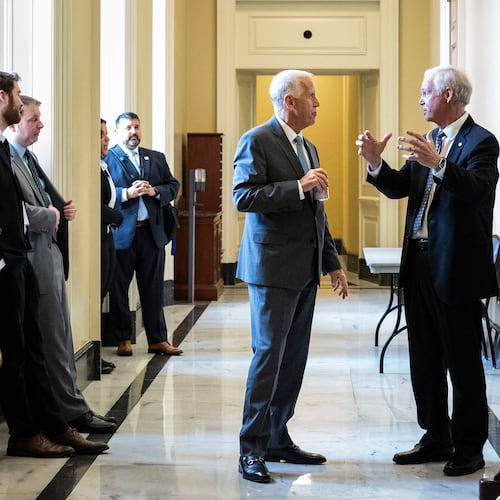The terrorist act that birthed the Department of Homeland Security also brought forth an immigrant’s nightmare: Kansas secretary of state and gubernatorial candidate Kris Kobach.
Gee, thanks, Osama bin Laden.
Kobach, a self-described “full-throttled conservative,” emerged in subsequent years as a bullhorn for the view of immigrants as terrorists, drug smugglers, fraudulent voters, members of violent gangs and job stealers. He’s swaddled himself in tones of patriotism, pitching legal cases against allowing the so-called Dreamers the opportunity to pay in-state fees for college and arguing for making every police officer, sheriff’s deputy and highway patrolman or woman double as an immigration enforcer — an idea abhorred by every major law enforcement organization.
Now we’ve learned that President Donald Trump seriously considered Kobach for secretary of Homeland Security last summer when John Kelly left the position to become White House chief of staff.
NBC News reported Kelly suggested Kobach, along with Kirstjen Nielsen, who got the post.
Kobach was in his first week in the office of then-Attorney General John Ashcroft when the planes were flown into the World Trade Center towers and the Pentagon. Already assigned immigration as part of his duties, Kobach credits that horrible day with jump-starting his hyper-focus.
It was the beginning of solidifying a viewpoint that equates terrorism with immigrants.
Part of the reordering of immigration, to account for the fact that the hijackers had initially arrived as legal immigrants, was the creation of the Department of Homeland Security and the implosion of the Immigration and Naturalization Service.
A timeline since then could trace just how toxic messaging on immigrants has grown. And it helps explain how, in subsequent years, government officials largely missed that homegrown terrorists would take more American lives than foreign ones.
“Our country doesn’t have a national strategy for immigration and refugees,” said Mary Giovagnoli, executive director of Refugee Council USA.
That lack of vision leaves the nation vulnerable to swaying away from core values of fairness and accountability; it leaves us ill-prepared to defend the nation and mitigate global impacts in times of strife or upheaval, such as a terrorist attack.
Without a clear understanding of how dysfunctional U.S. immigration policy has become, xenophobic demagogues will continue to make it worse.
Indeed, that was a major factor in the election of Trump and could very well help land Kobach a new job as governor of Kansas.
Kobach projects a vision of the world in black and white. It works on the campaign trail. It’s a disaster for solid public policy.
Consider that less than a week after Sept. 11, with more than 3,000 people dead, then-President George W. Bush visited the largest mosque in Washington. He called Arabs and Muslims living in the nation American patriots, quoted from the Qur’an and said, “The face of terror is not the true faith of Islam.”
Bush’s approach was termed by the New York Times “retaliation abroad and tolerance at home.”
Imagine how the current president — who is fighting a legal battle to demand bans on travel from some majority Muslim countries — would have reacted to 9/11.
Kobach’s career has followed the trajectory of a generation’s worth of blind rage and backlash. It has produced no accomplishment of value but rather has further frayed the bonds that hold America’s body politic together.
About the Author
Keep Reading
The Latest
Featured


